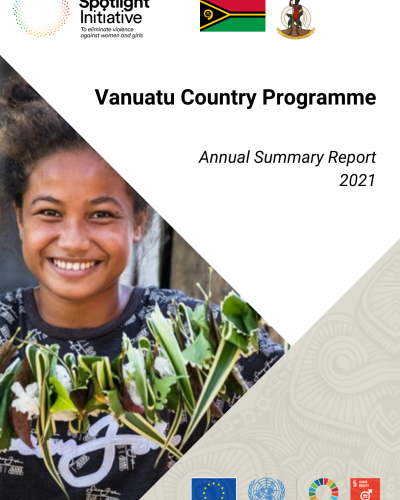Spotlight Initiative Vanuatu Regional Programme

Recipient UN organisations: UNFPA, UNDP, UNICEF, IOM
Other partners: UN Women, Department of Strategic Policy, Planning and Aid Coordination; Prime Minister’s Office; Ministry of Justice and Community Services; Ministry of Health; Ministry of Education and Training; Department of Women’s Affairs; National Disaster Management Office; Ministry of Youth and Sport; Vanuatu National Statistics Office; Department of Labour and Employment Services; Judiciary – Office of Public Prosecutions; ActionAid, SISTA, Vatu Mauri, ACTIV, the General Council of the Assemblies of God, ISRAAID, Silae Vanua, Vanuatu Internet Governance Forum; Vanuatu Family Health Association; Wan Smol Bag; Vanuatu Council of Churches; National Youth Council; IPPF, World Vision; Nossal Institute/University of Melbourne.
Context
In 2021, Vanuatu was affected by a series of calamities including TC Harold, volcanic ashfall, acid rains, flooding, and COVID-19. These factors had a significant compounding impact on livelihood, including increase in food prices, food shortage and lack of work, exacerbating existing inequalities, and disproportionally impacting women, girls, and at-risk communities. The closing of schools and the return of many ni-Vanuatu to rural areas, also increased women’s domestic responsibilities and unpaid labour, while damage to key infrastructures, led to limited access to healthcare services and disruption in supplies. Internal changes, such as the abolishment of the Ministry of Justice and Community services and the restructuring of other services, also impacted implementation of the Programme.
Spotlight Initiative’s Response
Despite the challenges faced by the entire EVAWG ecosystem, the Spotlight Initiative has been catalytic in mobilising UN agencies, national government partners and civil society organisations (CSOs) to combine diverse, complementary mandates, expertise, and technical contributions for effective, comprehensive, and coherent support to EVAWG in the country. The Programme supported implementation across humanitarian and development nexus, strengthening institutional capacity, and developing multi-stakeholder essential services and standard operating procedures (SOPs), including for the Clinical Management of Rape, Sexual and Gender-Based
Violence, and Gender-Based Violence in Emergencies (GBViE), and adapted for natural disasters’ response, migration and COVID19.
The curricula for Comprehensive Sexuality Education and Family Life Education for in and out of school programmes, masters’ trainings and trainings of trainers enabled the roll out of the programme in schools. Grants to local and grassroots organizations have yield political engagement, stronger advocacy, and increased resilience. This has been further strengthened by the renewed engagement with the EVAWG Civil Society Reference Group and the Steering Committee, now encompassing several donors, government, UN, and CSOs.
Key results can be accessed by downloading the full report.









